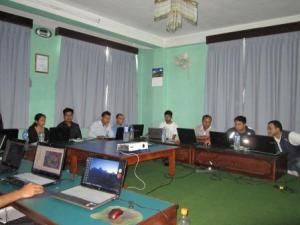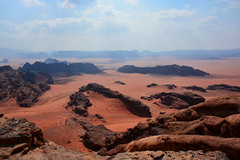Training and discussions At SEN
A Basic Training on GIS
21 June-7 July, 2012
Geographic Information Systems (GIS) is an efficient tool for managing, manipulating, analyzing, and displaying huge volume of multi-layered geographic information. GIS allows us to view, understand, question, interpret, and visualize data in many ways that reveal relationships, patterns, and trends in the form of maps, globes, reports, and charts. A GIS is a tool for making and using spatial information. It is a computer-based system to aid in the collection, maintenance, storage, analysis, output, and distribution of spatial data and information. GIS and spatial analyses are concerned with the quantitative location of important features, as well as properties and attributes of those features.
The objective of this twelve days course is to introduce the participants to the principles and concepts of GIS technology and its current and potential applications.
Contents:
- Brief introduction on Available GIS products in the market ( Major Companies, Open Source, Available online tutorials, online data sources)
- Introduction to GIS, and database acquisition
- Projects, Views, Table of Contents and Layers
- Geo-referencing the image.
- Digitization of point, line and polygon.
- Table of contents, symbols, color schemes, classification, normalize, color ramps and attributes.
- Join data tables using common fields. The purpose of joining tables is to add more data to your project.
- Convert selected features into a new shape file.
- How to find features that are inside other features.
- Perform a spatial analysis operation by selecting features.
- Geo-processing wizard.
- Projection system and changing the projection system from one system to other
- 3D analysis, spatial analysis with raster data.
- Profile, adding X,Y coordinate
- Working on layouts
- Hydrological modeling
- Integration with Google-earth (Data acquisition, River shifting pattern, Detecting the expansion of glacial lake)
- Practical use of GIS on different field
Resource Person: Mr. Ananta Man Singh Pradhan, Engineering Geologist, Ministry of Energy
Date: 21 June-7 July, 2012
Course Duration: 24 hours (12 days, except Fridays and Sundays)
Time: 7 am to 9 am
Venue: The Small Earth Nepal Office, Bijulibazar, Kathmandu
Participants: Graduate Students, Mid Career Professionals
Total Number of Participants: 15
Training Fee: NPR 8000 (NPR 4000 for students with recommendation from their colleges/universities)
Deadline for application: 15 June 2012
Notes:
1. Participants should bring their own laptop
2. Your participation will be confirmed only after full payment. Payment can be made either at SEN
office or at the bank (Account Name: The Small Earth Nepal, A/C No.: 00100003755R, NMB Bank
Ltd, Babarmahal)
3. For online application form, click here
For further details, contact
Soni Aryal
Program Officer
The Small Earth Nepal
Ph: 977-1-4782738
Training on MATLAB
24-28 May, 2012
The MATLAB is high-performance programming language for technical computing integrates computation, visualization, and programming in an easy-to-use environment where problems and solutions are expressed in familiar mathematical notation. MATLAB integrates computation, graphics, and programming in a flexible, open environment. Known for its highly optimized matrix and vector calculations, MATLAB offers you an intuitive language for expressing problems and their solutions both mathematically and visually.
Typical uses include:
- Numeric computation and algorithm development
- Symbolic computation (with the built-in Symbolic Math Toolbox)
- Modeling, simulation, and prototyping
- Data analysis and signal processing
- Engineering graphics and scientific visualization
- Application development, including graphical user interface building
MATLAB has evolved over a period of years with input from many users. In university environments, it is the standard instructional tool for introductory and advanced courses in mathematics, engineering, and science. In industry, MATLAB is the tool of choice for high productivity research, development, and analysis.
Contents:
- Introducation To MATLAB (MATLAB overview, Documentation, getting help and demos, MALAB program window and tools, general commands, input and output)
- Matrix and Arrays (Matrixes overview, in-built matrixes functions and dimensions, magic function, arrays overview, cells, variables, operators, numbers, strings, functions, linear algebra)
- Graphics (Plotting graphics, overviews of the plotting, editing plots, plotting tools, graphics for presentation, curve fitting, graph types)
- Introduce to M-Files (Introduction to M-files, multiple syntax, flow control)
- MATLAB Toolbox (Introduction to MATLAB toolbox)
Resource Person:
Mr. Paras Karki
- Founder and Project Manager, HTML Geeks Design Studios
- MS By Research in Electrical Engineering “Design and Construction of Grid Tied Solar Photovoltaic System”, Kathmandu University, Dhulikhel, Nepal
Date: 24 -28 May 2012
Time: 3 pm to 6 pm
Venue: The Small Earth Nepal Office, Bijulibazar, Kathmandu
Participants: Graduate Students, Mid Career Professionals
Total Number of Participants: 15
Training Fee: NPR 8000 (NPR 4000 for students with recommendation from their colleges/universities)
Deadline for application: 22 May 2012
Notes:
1. Participants should bring their own laptop
2. Your participation will be confirmed only after full payment. Payment can be made either at SEN office or at the bank (Account Name: The Small Earth Nepal, A/C No.: 00100003755R, NMB Bank Ltd, Babarmahal)
3. For application form, download from website: http://www.smallearth.org.np
For further details, contact
Soni Aryal
Program Officer
The Small Earth Nepal
Ph: 977-1-4782738
Email: soniaryal200@gmail.com
Training on R
20-27 May, 2012
R is a programming language, widely used in science for data analysis and modeling.
Advantage of R over other data analysis softwares
1) R is a modern programming language with high flexibility for writing functions or coding statistical models that fits different designs,
2) A language is easier to communicate with others over e-mail etc. than “point-and-click”
3) R is continuously being developed by professional statisticians and programmers from reputable scientific groups,
4) R is available for most operative systems, and
5) R is open source software!
Contents
• R- installation and Introduction of R (R-as calculator, Important Rules, data import, few basic statistical calculations)
• R- package installation (making vector and combining, more statistical calculations, plotting basic figures, library installation and loading)
• Plots (Entering data, More plots, parameter change in plot and few complicated plots, multiple plot, Help search and functions)
• Test statistics [T -test (one, two, paired, wilconson), Z-test, Chi-test, Power test]
• More controls in R (Command Vs Script, data editor, housekeeping, tidiness, simple to complex plots, multiple axes plot, self controlled scatter plot, matplot)
• Test statistics (One-way and Two way ANOVA, MANOVA, ANCOVA)
• Regression (Linear, Multiple)
• Advance plots (plot and legends)
• Others
Resource Person
Mr. Madan K. Suwal
- M.Sc. Environmental Science, Tribhuvan University
- M.Sc. Biodiversity and Environmental Management (TU in Nepal & University of Bergen, Norway).
- Practicing R since 2008, and took classes of R for scientists in NAST and PhD candidates of Central Department of Botany TU.
Date: 20-27 May 2012
Time: 7 am to 9 am
Venue: The Small Earth Nepal Office, Bijulibazar, Kathmandu
Targeted Participants: Graduate Students, Mid Career Professionals
Total Number of Participants: 15
Training Fee: NPR 9000 (NPR 4500 for students with recommendation from their colleges/universities)
Deadline for application: 18 May 2012
Notes:
1. Participants should bring their own laptop
2. Your participation will be confirmed only after full payment. Payment can be made either at SEN office or at the bank (Account Name: The Small Earth Nepal, A/C no.: 00100003755R, NMB Bank Ltd, Babarmahal)
3. For application form, download from website: http://www.smallearth.org.np
For further details, contact
Ms. Soni Aryal
Program Officer
The Small Earth Nepal
Ph: 977-1-4782738
Email: soniaryal200@gmail.com
Basic Training on Hydrological Analysis and Water Resource Management
6-17 November 2011
 The Small Earth Nepal announces the training program on “Basic Training on Hydrological Analysis and Water Resource Management
The Small Earth Nepal announces the training program on “Basic Training on Hydrological Analysis and Water Resource Management
Date: 6-17 November 2011(11 days)
Time: 4-6 pm
Venue: The Small Earth Nepal (SEN), Bijulibazar, Kathmandu
Resource Persons:
1. Er Kiran Shankar Yogacharya, Executive Director, Hydro-Engineering Services (P.) Ltd., (Former Director General, Department of Hydrology and Meteorology)
2. Dr. Laxmi Prasad Devkota, Senior Research Scientist (Water Resources), Nepal Development Research Institute
3. Dr. Dilip Kumar Gautam, Senior Divisional Hydrologist, Department of Hydrology and Meteorology
Contents:
1. Basic Hydrological Concepts
2. Data Preparation
3. Flow Analysis
4. Hydrological Design: Bridge, Side drains, Culverts
5. Application of GIS on Hydrology (Introductory)
6. Impact of Climate Change in Hydrology
7. Hydrological Modeling
Targeted Participants: Graduate Students, Mid-Career Professionals
Total Number of Participants: 15
Training fee: NRS 10,000 (NRS 5000 for graduate students with recommendation letter from their colleges/universities, limited seats are available)
Deadline for application: October 31, 2011
Note:
• Participants are requested to bring their personal laptop during the session
• Online application form can be submitted at this link http://goo.gl/LB7Db
• Students are requested to submit their recommendation letter from their college/universities at info@smallearth.org.np before the deadline.
•Your participation will be confirmed only after full payment. Payment can be
made either at SEN office or at the bank (Account Name: The Small Earth Nepal,
A/C No.: 00100003755R, NMB Bank Ltd, Babarmahal)
For further details, contact
Ms. Soni Aryal
Program Assistant
A Basic Training on GIS for Researcher
13-24 September 2011
 After the successful completion of Training on Data Analysis for Climate and Climate Change Studies, The Small Earth Nepal (SEN) announces “Basic Training on GIS for Researcher”.
After the successful completion of Training on Data Analysis for Climate and Climate Change Studies, The Small Earth Nepal (SEN) announces “Basic Training on GIS for Researcher”.
Date: 13 – 24 September 2011
Time: 0700 – 0900
Venue: The Small Earth Nepal (SEN), Bijulibazar, Kathmandu
Resource Persons:
Mr. Ananta Man Singh Pradhan, Engineering Geologist, Ministry of Energy
Targeted Participants: Graduate Students, Mid Career Professionals
Total Number of Participants: 15 (40% of total seat is reserved for graduate students).
Training Fee: NPR 8000 (NPR 4000 for graduate students with recommendation from their colleges/universities)
Deadline for application: 11 September 2011
Note:
• Participants are requested to bring their personal laptop during the session
• Application form can be downloaded from www.smallearth.org.np
• Filled form should be dropped at SEN office or can also be sent via e-mail at info@smallearth.org.np
• Your participation will be confirmed only after full payment. Payment can be made at SEN office or at the bank (Account Name: The Small Earth Nepal, A/C No.: 00100003755R, NMB Bank Ltd, Babar Mahal)
For further details, contact
Ms Soni Aryal
Project Assistant
Tel:977-1-4782738
Please click here for application form
Training on BTOPMC -A distributed hydrological model
19-23 September 2011
 Center of Research for Environment Energy and Water (CREEW) in collaboration with The Small Earth Nepal (SEN) and International Research Center for River Basin Environment – University of Yamanashi (ICRE-UY) announces Training on BTOPMC, A Distributed Hydrological Model, developed by a team of University of Yamanashi, Japan.
Center of Research for Environment Energy and Water (CREEW) in collaboration with The Small Earth Nepal (SEN) and International Research Center for River Basin Environment – University of Yamanashi (ICRE-UY) announces Training on BTOPMC, A Distributed Hydrological Model, developed by a team of University of Yamanashi, Japan.
BTOPMC is a physically based distributed hydrological model based on the block wise use of TOPMODEL with Muskingum-Cunge ow routing method, which is used in large river basins. It uses GIS in terrain modeling.
Date: 19-23 September 2011
Time: 2:00-5:00 PM
Venue: Center of Research for Environment Energy and Water, Kathmandu
Key Resource Persons:
• Dr. Khada Nanda Dulal (Kantipur Engineering College, Tribhuvan University, Nepal)
• Dr. Jun Magome (ICRE-UY)
• Dr. Vishnu Prasad Pandey (ICRE-UY)
Targeted Participants: Graduate Students and Mid-Career Professionals
Total Number of Participants: 15
Training Fee: Rs. 500
Participants may apply online via info@smallearth.org.np / creew2008@yahoo.com or visit the SEN/CREEW office to drop the form along with the training fee.
Notes:
• The application will open till the seats are filled up, and will be based on first come.
• Participants are requested to bring their personal laptop during the sessions.
• All the participants should have basic knowledge on GIS.
• This training would be considered as an on-site training for Virtual Academy (VA). Therefore, all the participants are expected to enroll to VA first. UY would prepare username/password for each of them. Before starting the training, the participants are expected to complete the basic course (through internet).
• Tea/cookies and required stationeries/software would be provided during the training sessions.
The last date of application is September 10, 2011.
For further details, contact
Ms Soni Aryal
Project Assistant, SEN
Tel: 01-4782738
Ms Manisha Sthapit
Research Assistant, CREEW
Tel: 01-4411918
Click here to download application form
Training on Data Analysis for Climate and Climate Change Studies (15 – 19 August 2011)
Introduction
 Climate change is no longer a scientific curiosity; it is a reality now with direct impact in various sectors of the society, namely, in economy, health and safety, food production, security, and other dimensions of human aspects. Climate change is the global challenge today, and is one of the burning issues in Nepal as well. It is, therefore, of utmost importance to understand climate change and quantify it so that it can be applied in various relevant disciplines. The training on “Data Analysis for Climate and Climate Change Studies” is expected to make the trainees understand and analyze the climatic data which will help to broaden their knowledge in the field of climate change and at the same time effectively use the tools in their works.
Climate change is no longer a scientific curiosity; it is a reality now with direct impact in various sectors of the society, namely, in economy, health and safety, food production, security, and other dimensions of human aspects. Climate change is the global challenge today, and is one of the burning issues in Nepal as well. It is, therefore, of utmost importance to understand climate change and quantify it so that it can be applied in various relevant disciplines. The training on “Data Analysis for Climate and Climate Change Studies” is expected to make the trainees understand and analyze the climatic data which will help to broaden their knowledge in the field of climate change and at the same time effectively use the tools in their works.
Date: 15 – 19 August 2011
Time: 0700-1000
Venue: The Small Earth Nepal (SEN),Bijulibazar, Kathmandu
Training Contents:
1. Introduction of Climate Data; Data errors; Data Units
2. Basic Statistical Concept for Climate Data Analysis
3. Data Handling
4. Climatic Indices for Climate Change Analysis
5. Spatial Climate Data Analysis
Resource Persons:
Dr. Madan Lall Shrestha, Academician, Nepal Academy of Science and Technology
Professor Lochan Prasad Devkota, Head, Central Department of Hydrology and Meteorology, Tribhuvan University
Mr. Saraju Kumar Baidya, Chief, Climate and Data Sections, Department of Hydrology and Meteorology
Targeted Participants: Graduate Students, Mid Career Professionals
Total Number of Participants: 16 (40% of total seat is reserved for graduate students)
Training Fee: NPR 8000 (NPR 4000 for students with recommendation from their colleges/universities)
Deadline for application: 5 August 2011
Notes:
- Participants are requested to bring their personal laptop during the session.
- Application form can be downloaded from www.smallearth.org.np.
- Filled from should be dropped at SEN office or can also be sent via e-mail at info@smallearth.org.np.
- Your participation will be confirmed only after full payment. Payment can be made at SEN office or at the bank (Account Name: The Small Earth Nepal, A/C No.:00100003755R,NMB Bank Ltd,Babar Mahal).
Application Form: In Word
Application Form: In PDF
Effective CV writing training at SEN
The Small Earth Nepal (SEN) organized one day training on CV writing at SEN meeting on 30 April 2011. In the program Mr. Dhiraj Pradhananga, the President of the SEN, made a presentation on effective CV writing. He discussed about the importance of CV and shared his experiences of CV writing during his professional as well as academic career. The training was interactive.
More than 20 participants, who were the regular staff, volunteers/interns of SEN, and university students, benefited from the training. Participants showed their gratitude towards SEN for providing such opportunity to participate in the training.









Sep 03, 2011 @ 10:55:33
i think the programme was successful..
n wat abt giving the same training again …..
Sep 08, 2011 @ 18:07:35
We’ll conduct the same training soon. Recently, we are conducting GIS training from 13 – 24 September 2011.If u are interested to be part of it please visit our website http://www.smallearth.org.np or our Blog https://smallearthnepal.wordpress.com.